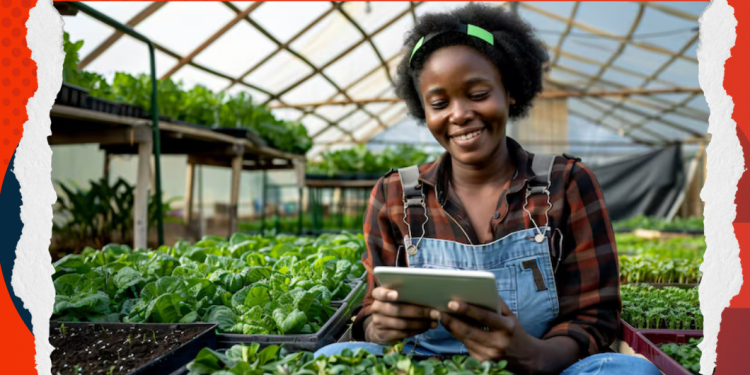Sammy Selim thought he knew farming. For years, he grew coffee on his small plot in Kenya using methods passed down from his father. Then he discovered an AI app that changed everything. His harvest jumped from 2.3 tonnes to 7.3 tonnes, which is more than triple his previous yield.
Selim’s story reflects a quiet revolution happening across Africa. Farmers are ditching guesswork and embracing smart technology to feed a continent heading toward 2.5 billion people by 2050.
Mobile Apps Put Expert Knowledge in Every Farmer’s Pocket
Kenya’s Sammy Selim used to test his soil by sending samples to distant labs. Results took months to arrive. Sometimes they never came at all. Now he uses Virtual Agronomist, an AI tool that delivers soil analysis through WhatsApp messages.
The app asks simple questions about his farm location and crops. Within minutes, it tells him exactly which fertilizers to use and in what amounts. “My God!” Selim exclaimed when the app recommended far less fertilizer than he planned to use. “I could have wasted money.”
This technology addresses a critical gap. Kenya has only one agricultural extension officer for every 1,093 farm households, which is far below the recommended 1:400 ratio.
Across Africa, similar platforms are spreading fast:
- iShamba in Kenya provides personalized farming advice via SMS
- Esoko in Ghana delivers market prices and weather alerts to 350,000 farmers
- Hello Tractor in Nigeria lets farmers rent equipment through text messages
- AgroCenta connects smallholder farmers directly to buyers
IoT Sensors Track Every Drop of Water and Grain of Soil
Nigerian cassava farmers using IoT soil sensors increased their yields by 15-25% while cutting water use by 30%. These small devices buried in fields monitor soil moisture, temperature, and nutrient levels around the clock.
Boniface Nzivo tends cucumbers in Machakos County, Kenya, using a system called FarmShield. Sensors inside his greenhouse track temperature, humidity, and soil moisture. The system tells him exactly when and how much to water his crops. “I don’t waste time trying to figure out how much water to use,” Nzivo explains. “It’s great technology.”
The data helps farmers make precise decisions:
- Soil pH levels (ideal range: 6.0-7.0)
- Moisture content (optimal at 50-75% field capacity)
- Temperature ranges (15-25°C for most crops)
- Nutrient levels for nitrogen, phosphorus, and potassium
Drones Spot Problems Before They Spread
Farmers in Rwanda prevented 50% of crop diseases by using drones equipped with cameras and sensors to detect early signs of plant stress. These aerial scouts create detailed farm maps and identify pest infestations before they become disasters.
Musau Mutisya from Machakos County uses his smartphone camera with PlantVillage, an AI app that diagnoses crop diseases. He points his phone at a damaged maize leaf, and the app identifies fall armyworm within seconds. It then suggests specific treatments. “We were doing guesswork in the past,” Mutisya says. “You’ll end up spending more money treating what you don’t know”.
Smart farming technology delivers measurable results across Africa:
- Nigeria: Farmers using mobile crop management apps increased production by 20%
- South Africa: Precision irrigation reduced water use by 30-50% while maintaining yields
- Rwanda: Coffee farmers boosted premium-grade production by 50%
- Kenya: Smart fertilizer systems cut nitrogen use by 25% and increased yields by 15%
Simple Technology Solves Complex Problems
African farmers face unique challenges: unpredictable rainfall, limited access to experts, and small plot sizes averaging 1-3 hectares. Smart farming technology addresses these issues through accessible solutions.
Most innovations work on basic smartphones using SMS or simple apps. Farmers don’t need expensive equipment or fast internet. LoRaWAN networks provide connectivity even in remote areas, reaching 10-15 kilometers from transmission points.
The technology democratizes expert knowledge. Virtual Agronomist trains AI models using satellite data covering entire continents. PlantVillage learned from thousands of crop images to recognize diseases. This expertise now fits in every farmer’s pocket.
Startups Lead the Innovation Wave
African agtech startups raised significant funding in 2024, with agricultural marketplaces and fintech leading investment categories. These companies understand local farming conditions and build solutions that work in African contexts.
Twiga Foods in Kenya connects farmers directly to retailers, eliminating middlemen and increasing farmer income. Farmerline in Ghana provides digital advisory services through mobile platforms. UjuziKilimo offers soil analysis and farming recommendations tailored to East African conditions.
Connectivity Challenges Don’t Stop Progress
Only 46% of sub-Saharan Africa has 4G coverage, compared to 88% globally. However, innovative solutions work around these limitations.
Liquid Telecom deployed LoRaWAN networks across 22 Kenyan counties, enabling IoT applications without cellular coverage. Satellite IoT services from companies like Swarm Technologies bypass traditional infrastructure entirely.
Edge computing processes data locally, reducing dependence on constant internet connections. Farmers can collect information offline and sync when connectivity becomes available.
Training Bridges the Digital Gap
The Kenya Agricultural and Livestock Research Organization combines IoT training with traditional farming education. Programs teach farmers digital literacy alongside data interpretation and system maintenance.
Training components include:
- Basic smartphone and app usage
- Understanding sensor data and recommendations
- Simple troubleshooting for technical issues
- Data security and privacy protection
Local lead farmers with smartphones train their neighbours, spreading knowledge through existing social networks. This peer-to-peer model builds trust and accelerates adoption.
Affordable Access Opens Doors
Pay-as-you-go models make smart farming accessible to smallholder farmers. One Acre Fund connected 1.5 million farmers with agricultural technologies by 2023 through flexible financing.
Cooperative purchasing allows farmers to share equipment costs. Government subsidies support wider technology adoption. Hello Tractor’s IoT platform increased productivity by 40% and reduced costs by 35% for 250,000 Nigerian farmers through these approaches.
Youth Drive Agricultural Innovation
Young Africans see farming as a high-tech career opportunity rather than subsistence work. Social media platforms promote smart farming techniques and connect farmers with markets.
Ghana’s agriculture sector faces a $5 billion investment gap, but digital platforms help attract young entrepreneurs who develop innovative solutions for local challenges.
Climate Resilience Through Smart Adaptation
Smart farming helps African agriculture adapt to climate change. Weather monitoring systems provide early warnings for droughts and floods. Soil sensors optimize water use during dry periods. Disease detection prevents crop losses during unpredictable weather patterns.
The African Union’s Digital Transformation Strategy (2020-2030) supports universal access to digital technologies, recognizing their role in climate adaptation and food security.
Future Growth Depends on Infrastructure Investment
Rural connectivity remains the biggest obstacle to scaling smart farming technology. Governments and private companies must invest in digital infrastructure to reach more farmers.
Successful scaling requires:
- Expanded mobile network coverage in rural areas
- Affordable data plans for agricultural applications
- Training programs integrated into agricultural education
- Supportive policies that encourage technology adoption
- Public-private partnerships that share development costs
Agriculture Transforms from Tradition to Technology
African farmers are proving that small plots can produce big yields with the right technology. Smart farming tools turn smartphones into powerful agricultural instruments, giving farmers access to expertise that was previously available only to large commercial operations.
The transformation happens one farm at a time. Sammy Selim’s coffee yield tripled. Boniface Nzivo’s cucumber production became predictable and profitable. Musau Mutisya stopped guessing about pest control and started making informed decisions.
These individual successes add up to continental impact. As more farmers adopt smart technology, Africa moves closer to feeding its growing population while building climate resilience and creating economic opportunities for rural communities.
The combination of mobile connectivity, AI-powered advice, IoT sensors, and innovative financing is writing a new chapter in African agriculture. Farmers who embrace these tools are not just growing more food, they’re building the foundation for Africa’s food-secure future.
















